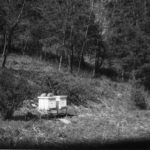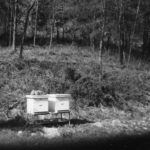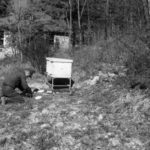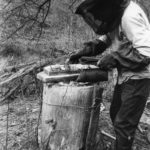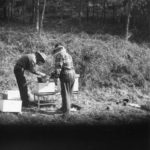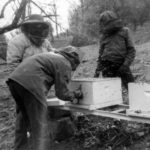Pine Mountain Settlement School
Series 11: FARM
Series 14: MEDICAL
FARM Bees

Group of handcrafted beehives for the production of honey. Selected Exhibit photos, PMSS. [misc_exhibit_013.jpg]
TAGS: bees, honey, honey bees, beehives, pollination, farming, bee gums, pesticides, Endangered Species Act, Environmental Protection Agency, agribusiness, agrichemical industry, neonics
FARM: Bees
For many years in the Pine Mountain valley beehives could be seen in the backyards of homes and bordering gardens. Honey was a staple of the diet, providing sweetness to Chess Pie and the spoonful of allergy remedy in the drinks of many. Honey was there to help the medicine go down, to sooth a baby’s stomach, and to doctor a bad cut. Its uses were many and well-known among the self-sufficient families who lived in the area.
BEES at Pine Mountain
Pine Mountain has just returned to beekeeping in 2016 with two new beehives. The timing of this initiative could not be soon enough. The state of the bee population in the United States and in other countries is not good. Over 700 bee species are declining and half of those troubled bees will be extinct if measures are not taken to protect them.
Pine Mountain Settlement School, as an eco-friendly environment, is doing its work in ensuring that bees remain in our fragile environment and that they continue to support the food-supply chain that we all depend on.
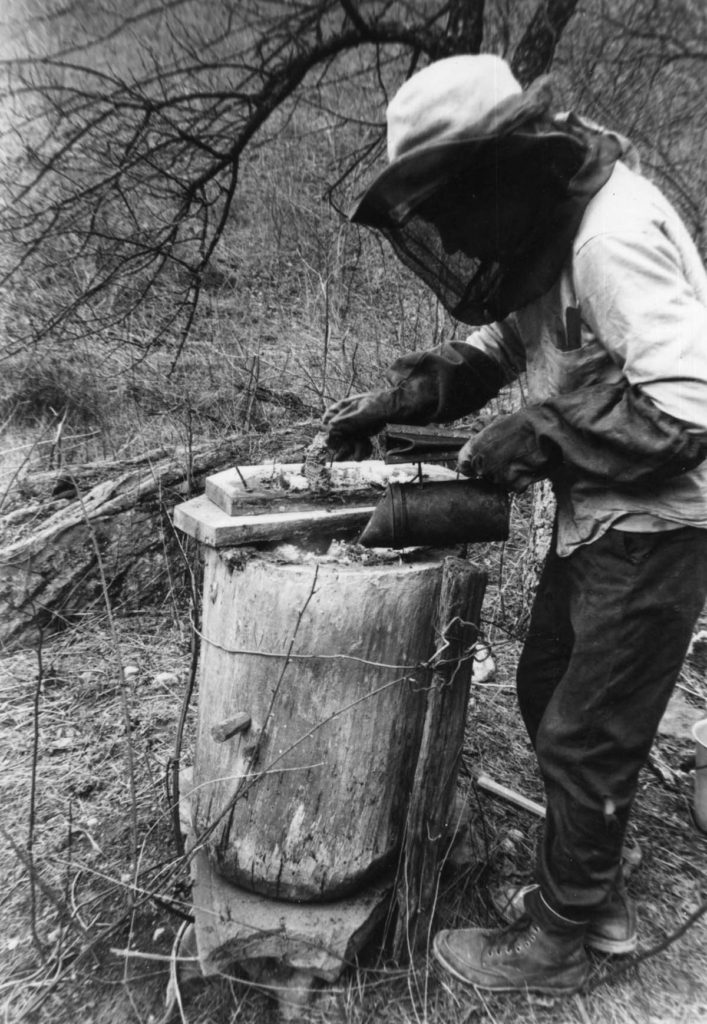
Beekeeping. VII 63 Life Work Maintenance, Farm, Grounds.[VII_63_life_work_001-68]
BEES Endangered by Pesticides
There have been repeated warnings that our pesticides are killing the bee populations in this country but there has been little response from the agrichemical industry in removing the new harmful agrichemicals from agribusiness. Pine Mountain is fortunate that it is isolated from many of these agrichemicals as large-scale farming is not practiced in the Pine Mountain valley. Locations such as the long protected valley have become scarce in today’s race to join the agribusiness interest. However, an increase in smaller truck-farms and organic farming efforts are taking a larger and larger portion of the market.
Bees are critical to our food supply. No bees, no food. The connection between the two is irrefutable. With the recent (2017) changes in EPA regulations, a fight is looming to keep even the current regulations in place which at least give the bees a fighting chance. just this past year bees gained some protection under the Endangered Species Act, but it is still not enough.
Bees pollinate 71 of the 100 crops that make up the staples of 90 percent of the world’s food. The main chemical threat is a new agrichemical compound called neonics, a chemical that is deadly to bees and that is largely responsible for the growing bee die-off. Several companies and businesses have agreed to stop selling products with the chemical. These include Lowes and Home Depot, and the company Ortho is reconsidering its distribution of the deadly chemical. But chemicals such as neonics should not be on the market. To allow them on the market is irresponsible and to remove the environmental guidelines that helped to ban them is, in the view of many, criminal.

Beekeeping, two hives. VII 63 Life Work Maintenance, Farm, Grounds. c. 1960s. [VII_63_life_work_001-74.jpg]
GALLERY
- Beekeeping, 2 hives. VII 63 Life Work Maintenance, Farm, Grounds.
- Beekeeping, 2 hives. VII 63 Life Work Maintenance, Farm, Grounds.
- Beekeeping. VII 63 Life Work Maintenance, Farm, Grounds.
- Beekeeping. VII 63 Life Work Maintenance, Farm, Grounds.
- Beekeeping. VII 63 Life Work Maintenance, Farm, Grounds.
- Beekeeping. VII 63 Life Work Maintenance, Farm, Grounds.
- Beekeeping. VII 63 Life Work Maintenance, Farm, Grounds.[VII_63_life_work_001-68]
- Beekeeping. VII 63 Life Work Maintenance, Farm, Grounds.
- Beekeeping.VII 63 Life Work Maintenance, Farm, Grounds.
- Beekeeping.VII 63 Life Work Maintenance, Farm, Grounds.
- Beekeeping. VII 63 Life Work Maintenance, Farm, Grounds.
- Beekeeping. VII 63 Life Work Maintenance, Farm, Grounds.
- Beekeeping. VII 63 Life Work Maintenance, Farm, Grounds.
- Beekeeping. VII 63 Life Work Maintenance, Farm, Grounds.
- Selected Exhibit. Group of bee hives for production of honey. [misc_exhibit_013.jpg]
Return To:
FARM AND FARMING Guide

